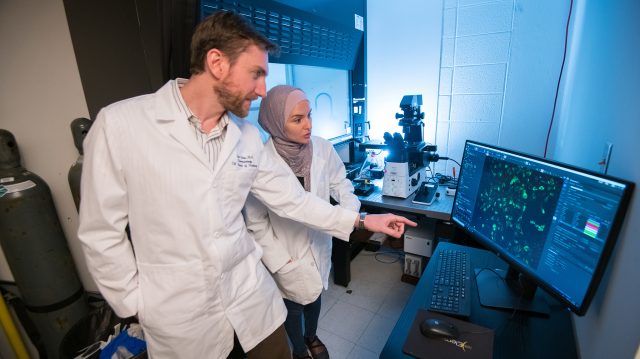
Archive Photo: Jason Paris (left) and fourth-year graduate student Alaa Qrareya image calcium in cultured neural cells in Paris’ laboratory in 2019 at the School of Pharmacy. Paris is part of a UM team that is studying compounds in cannabis that may hold promise as anti-inflammatory and pain-relieving medications. Photo by Kevin Bain/Ole Miss Digital Imaging Services
OXFORD, Miss. – Three researchers from the University of Mississippi School of Pharmacy have been awarded a $1.37 million grant from the National Institute on Drug Abuse, as their research focuses on reducing HIV-related pain through cannabis.
Nicole Ashpole, Mahmoud ElSohly and Jason Paris are screening and identifying the compounds found in cannabis that may hold anti-inflammatory and pain-relieving effects without the addiction potential.
“Cannabis has hundreds of compounds in it other than THC and CBD, and we don’t know much about how these compounds might affect the human body,” said Ashpole, assistant professor of pharmacology. “By exploring the effects of these compounds against HIV pain, we can gain insight into their potential benefits or risks in numerous other inflammatory disease states.”
Their individual expertise brings together a strong interdisciplinary research team. Ashpole and Paris, from the Department of BioMolecular Sciences, specialize in inflammation and aging as well as HIV and pain, respectively. ElSohly, director of the university’s Marijuana Project and professor of pharmaceutics and drug delivery, provides extensive knowledge on cannabis compounds and effects.
Through this collaboration, results could potentially provide improvements over current therapeutics available to HIV-positive and uninfected patients.
“Clinicians have found that HIV-positive patients use cannabis more frequently than the uninfected population,” said Paris, assistant professor of pharmacology. “When these patients are asked why, they often say that cannabis manages their chronic pain, which HIV predisposes them to, to a greater degree than currently available therapeutics.
“Our preliminary data suggest that some of the nonpsychoactive compounds in cannabis can reduce inflammation in the central nervous system and HIV-related pain using in vivo models.”
Cannabis research is nothing new at the university, as for more than 50 years the school and its National Center for Natural Products Research have provided standardized cannabis products for research through a competitive contract with NIDA.
“Our research capability, our expertise, our knowledge in the areas of cannabis chemistry and production, our personnel and facilities – everything reflects our deep commitment to excellence in cannabis research,” ElSohly said. “We are proud of the work we have done and continue to do as this field of research continues to grow.”

Mahmoud ElSohly has been studying the chemistry of cannabis for decades as director of the university’s Marijuana Project and a professor of pharmaceutics and drug delivery. Photo by Kevin Bain/Ole Miss Digital Imaging Services
Ole Miss researchers began working with cannabis in 1968, even before the Controlled Substances Act made cannabis a Schedule I controlled substance and before NIDA was established to advance science on drug use as it relates to public health.
Its longevity is a result of decades of honing the operation and with university researchers having a thorough understanding of the crucial need for studies that explore the potential therapeutic benefits, as well as the adverse health effects, of cannabis use.
In fact, a clinical study on CBD’s impact on certain forms of juvenile epilepsy began in 2018 at the University of Mississippi Medical Center, using standardized CBD-rich extract produced on the Oxford campus. It moved into a study of its long-term safety and effectiveness with an extension announced in December 2020.
To support researchers across the nation exploring cannabis use and public health studies, UM manufactures Good Manufacturing Practice cannabis extracts and standardized marijuana in the form of bulk plant material and cigarettes of various THC and CBD strengths, as well as placebo material that contains no cannabinoids.
This research can answer questions that could allow for a deeper understanding of both the plant and its implications on human health, Ashpole said.
“The School of Pharmacy has a long-standing expertise in cannabis-related research,” Ashpole said. “I feel very fortunate to be in an environment that is recognized as a stronghold in this field, and I’m delighted to think our ideas can continue to expand the research program here at the university.”
This research is supported by the National Institute on Drug Abuse, a division of the National Institutes of Health, through award no. R01DA052851.
